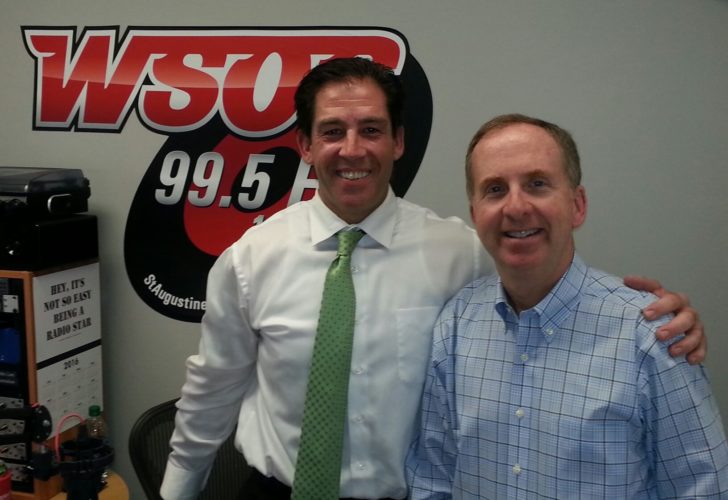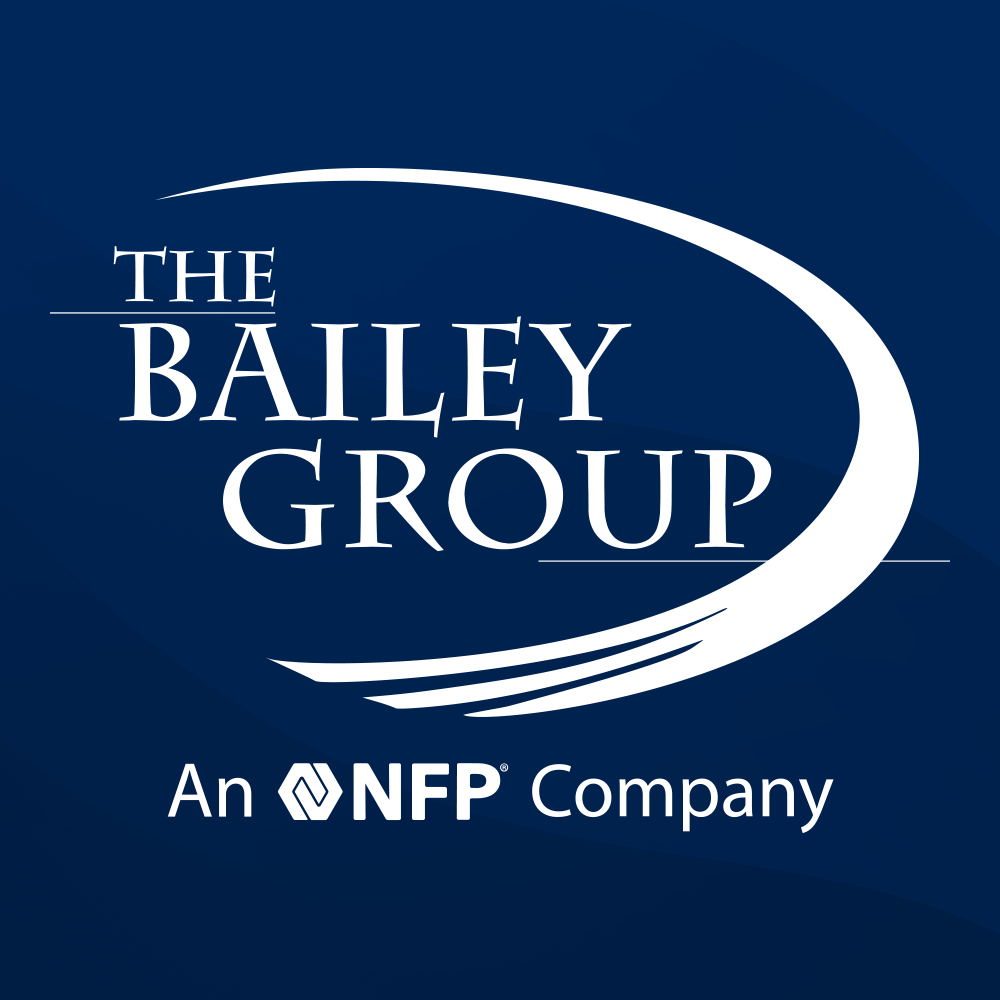Scott McIntosh Answers Your Burning Health Insurance Questions On WSOS
By The Bailey Group Marketing
Published January 25, 2016

Scott McIntosh, Licensed Agent with The Bailey Health Group, appeared on 99.5 WSOS on Wednesday, January 20th with Nico on the Scene to answer some common questions about the Obamacare (Affordable Care Act) January 31st deadline that’s just days away.
A few of the questions that were answered during the 20 minute interview include:
- When is the Health Insurance Open Enrollment deadline for 2016?
- What is the penalty for not having coverage in 2016?
- What’s the difference between Obamacare and the Affordable Care Act?
- How you can get a subsidy for health insurance coverage.
- Is the quality of Obamacare as good as traditional coverage?
- Why you can’t change your health insurance policy whenever you want.
- The benefits of working with a health insurance agent vs. using healthcare.gov.
You can listen to the entire interview below:
Audio Transcription
Kevin Geddings: 00:46 The Tokens on 99.5 WSOS and we’ve got Scott McIntosh here live in the studio along with Nico Recore from our team at WSOS. We’re talking about health insurance and, indeed, this is an important time to talk about it, right, Scott, because there’s a deadline looming. Talk to us about the deadline.
Scott McIntosh: 01:03 Yes, Kevin, thank you for having me. The open enrollment deadline actually runs from November 1st to January 31st this year, so, of course, now, we’re within the last two weeks of that enrollment period. If you don’t enroll by the end of the month, basically, you’re going to be looking at a two-and-a-half percent penalty based on your income or $695 per person or $2,085 per family, whichever is greater, either the dollar amount or the percentage.
Kevin Geddings: 01:34 We finally have gotten to that point, because early on when the Obamacare or the Affordable Care Act, however you want to rephrase it, there was always that notion that after a couple of years there would be a significant penalty if you did not have health insurance and it would be assessed by the IRS. We all know you can’t escape the IRS. We’re there, right? This is the year.
Scott McIntosh: 01:54 That’s right. Death and taxes, no getting away from them.
Kevin Geddings: 01:56 Yeah, so if you’re out there listening to us and the folks that are uninsured that are listening to us, and what’s your sense, I mean, you’re a professional, you’ve been around this business for decades now, what’s your sense of how many folks out there listening to us here in St. Johns County are still uninsured?
Scott McIntosh: 02:11 That’s really good question. The numbers come in and it’s tough to really trust a lot of that, but there still are quite a few individuals who are not insured. A lot of them are just frustrated with the system, they don’t want to be participating in something that they’re forced to do. The reality is it’s a win-win for everybody. The number one cause of financial ruin and debt in this country is unexpected medical bills, so it’s very important if folks, even though it can be a little pricey at times and that’s why the subsidy is in place and the Affordable Care Act was implemented was to help make healthcare affordable, but there still are those that are challenged with accepting that responsibility.
Kevin Geddings: 02:49 That’s Scott McIntosh. He’s a licensed agent obviously that has a lot of experience in dealing with health insurance matters. He is with the Bailey Health Group, and, of course, the Bailey Group located right there on the other side of the 312 Bridge and you can always reach them online at mbaileygroup.com. That’s mbaileygroup.com. We’ll put a link to Scott and to the Bailey Group on our Facebook page at WSOS Radio, so you can just access that if you’re driving around and it’s difficult to jot down phone numbers and the like. Talk to me a little bit about the subsidy. I know everybody’s case is different, but, obviously, health insurance cost blank and there’s money out there from the federal government to help pay for it, correct?
Scott McIntosh: 03:27 That’s right.
Kevin Geddings: 03:28 What’s a typical scenario? What can somebody maybe expect to see in terms of help from the feds and paying for health insurance? Especially if you’re somebody out there listening to us, maybe you’ve been a server at a bar or restaurant, you just haven’t had health insurance maybe ever, but now you maybe have the opportunity and perhaps the government will even help you pay for it.
Scott McIntosh: 03:46 That’s right. The subsidy was made available– Just so you get clarified, the Obamacare is essentially the Affordable Care Act. It’s been nicknamed that and, once again, the whole idea is to create an affordable health insurance for everybody. The government’s idea is they really don’t want anyone have to spend more than 9.5% of their income towards their health insurance, so a formula has been established, a bracket, if you will, of incomes to help, basically, one way or another adjust people’s income so that everyone is kind of in that same fair playing field of around 9.5% of their income going towards their healthcare.
Scott McIntosh: 04:23 To give you an example, say you had a family of four, all right. That family, if they have an income between $24,000 and $97,000, they can actually qualify for help. It’s quite enormous number. It’s not just the subsidy that’s available which help lowers the premiums, but, also, if you’re within 100 to 250% of the poverty level, so in that example I just gave you of 24,000 to 97,000 and that family of four made under $60,000, they would not only get the assistance helping to lower their premiums, but they would also get assistance lowering their deductibles and their co-pays, which can be even more significant in the actual premiums savings itself.
Kevin Geddings: 05:06 You’ve been around health insurance, Scott, for a long time, is the quality of the health insurance that you can obtain through the Affordable Care Act-Obacamare, whatever you want to call it, is it as good as what we have come to expect from, say, employer provided health insurance plans, say, ten years ago?
Scott McIntosh: 05:23 Yeah, it’s even better. The Affordable Care Act, once again, the purpose is also to make sure ten essential benefits are now in all healthcare plans. That wasn’t something of the past. Before, if you try to get an individual plan, you had to go through underwriting to qualify, so if you were in a pinnacle of health, you would either have those benefits rider’d out, which means they would not cover those in your policy, or you just wouldn’t be approved all together.
Kevin Geddings: 05:49 Right, so those were back in the days when someone had Type I Diabetes and a preexisting condition, so, boom, you wouldn’t get health insurance or, if you did, it was going to be three grand a month.
Scott McIntosh: 05:59 Exactly, and it probably wouldn’t cover that diabetes if you had it.
Kevin Geddings: 06:02 Regardless of your politics, of course the goal in all these with the Affordable Care Act or with Obamacare is the goal you always have with insurance. The more people that are insured, especially healthy people, then the less it cost for everybody. The bigger the pool, the less the money.
Scott McIntosh: 06:15 That’s right, exactly, and Medicare is predicated on that. That’s why everybody pays in, pays a little tax, comes out of their paychecks to help– So everybody can afford Medicare, everyone has to be part of Medicare, and that’s what help keeps the cost down.
Kevin Geddings: 06:29 Once again, that’s Scott McIntosh. He’s a licensed agent. He’s been doing this health insurance stuff and helping Medicare patients as well or Medicare beneficiaries as well as just the rest of us who, obviously, can get health insurance through the Affordable Care Act and through Obamacare. At the end of the day, it’s almost like not only in this year are you leaving money on the table, because the feds are willing to help a lot of people depending on their income, but you’re going to get fined to boot. I mean, this really is a key financial decision. Even if you’re just mad as heck about Obamacare, you need to just take advantage of it because you’re going to pay one way or the other.
Scott McIntosh: 07:03 That’s right, you really are, and like I mentioned before, the benefits that come along with health insurance, you just can’t put a price on it until you don’t have it. I always say you never know what you got till it’s gone [chuckles]. Well, if your health goes and you don’t have health insurance, you’re going to be in trouble, and, like I said, those bills don’t go away. They stay with you forever, so it’s important. Not only are you going to gain the health benefits if you have something happen, no one gets a letter in the mail saying, “Guess what, you’re going to get sick next week,” it just happens, so when you have coverage, I’ve never met anyone who complained about having coverage once they used it. They’re always very grateful that they did.
Kevin Geddings: 07:38 That’s a good point, Nico. What if we could get a letter that said, “Hey, next week you’re going to get sick. You’re going to break your leg next week.” That would add to some stress in your life, wouldn’t it?
Nico Recore 07:47 I’m all set with my insurance, though. I’m ready. Bring it.
Kevin Geddings: 07:50 Yeah [laughter]. When we come back, I want to explore a little bit more about what Nico is feeling because I think she has a very typical situation here in St. Augustine. In the meantime, check out our Facebook page here in just a few minutes. Nico will put some information up there on that, right?
Nico Recore 08:03 Yeah.
Kevin Geddings: 08:04 You can do that, and then you can always call, too, and ask for Scott McIntosh. Set up a time to sit down and talk with him. He’s not going to charge you anything for that, right, Scott?
Scott McIntosh: 08:12 That’s absolutely right.
Kevin Geddings: 08:13 Yeah, consultations don’t cost you anything. Maybe look at, bring with you what you currently have for health insurance. Maybe you have something under the Affordable Care Act that you signed up for last year and you got some issues with it, it’s not working as well for you, there are options, but those options and that opportunity to change coverage is [just?] going to end here in about 10 or 11 days. You can reach Scott at 417–6016. That telephone number, again, 904–417–6016, if you, a loved one, a neighbor, a friend is concerned at all about health insurance here in greater St. Augustine. We’ll be right back. [music]
Kevin Geddings: 08:55 The Easybeats and Friday On My Mind. It’s okay for you to have Friday on your mind. It’s late Wednesday afternoon about 19 minutes after 3:00 and we’re playing some great music and we’re having a good time. We’re learning a lot, too, from Scott McIntosh. He is with the Bailey Health Group. Of course, the Bailey Group, their office is located just over the 312 Bridge on the island. Of course, they’ve been a part of our community for a very, very long time, Mark Bailey and Mark Jr., the whole team there. Scott is part of that team. He’s a licensed agent. He knows a lot about health insurance. He’s helped Medicare beneficiaries for years and we’re here talking right now about the Affordable Care Act because Obamacare, Affordable Care Act, whatever you want to call it, it’s the same thing, terms are interchangeable, but the ability to change policies or to sign up basically ends soon, right, Scott?
Scott McIntosh: 09:36 That’s correct, January 31st.
Kevin Geddings: 09:39 January 31st, so if you don’t sign up by January 31st, what happens then? Can you still sign up and get health insurance and not have to pay the IRS penalty?
Scott McIntosh: 09:49 No, you’re out of luck.
Kevin Geddings: 09:50 Really?
Scott McIntosh: 09:51 Unless you have a special election like your family changes if you move outside of your zip code. Basically, a life change in some manner, and there’s only a few of those as it is, then, basically, you’re locked in until next November.
Kevin Geddings: 10:04 Help me understand as a layman. Why do that? Why not just make it where I can just get health insurance through the Affordable Care Act whenever I want?
Scott McIntosh: 10:13 It used to be that way back when it was underwritten. That’s really the element that makes the enrollment period necessary is, because there is no preexisting conditions, there’s no underwriting, so, basically, to keep people from just jumping on the insurance when they need it. Before, with underwriting, it didn’t matter when you enrolled because you had to qualify. Now, you don’t have to qualify medically. You can just… Yeah.
Kevin Geddings: 10:35 That makes sense, doesn’t it, Nico? Yeah, somebody gets a cancer diagnosis today, may go see Scott, and say, “Hey, I need health insurance,” but that defeats the whole purpose of having an insurance pool that we all participate so that when one of us does get sick, it’s there, and those of us that are healthy are paying for it.
Scott McIntosh: 10:51 That’s right.
Kevin Geddings: 10:52 Okay, I learned something today, so that’s good. Talk to me a little bit, too, about people would say, “Well, I can just go on healthcare.gov. I’d just go on the government website and get my Obamacare insurance that way.” Talk to me about why that may not be such a good idea.
Scott McIntosh: 11:07 Unfortunately, the platform that’s been established just hasn’t kept par. There’s been a lot of issues with it both from a billing standpoint. Obviously, when you get towards these deadlines, the bottlenecks, and you have a lot of people trying to last minute make their changes, so the website itself, although it has gotten better, still suffers through some challenges. Unfortunately, there have been quite a few this year and people will get notices and reminders and things of that that may not be accurate.
Kevin Geddings: 11:38 Yeah, let’s be blunt, too. I think a lot of people feel like, “Well, if I just go straight to the government’s website, I’m going to get the cheapest, the least costly health insurance options,” but, indeed, that is not the case.
Scott McIntosh: 11:50 That’s right. Most folks feel like if they go on it themselves, they’ll save money in time, but, in essence, what it does is actually cost potentially more time and maybe more money. There are no charges for the services of us at the Bailey Group. We’re compensated by the insurance companies, so we basically work as a liaison for folks, keeping along with the Bailey tradition, we really put people first. It really is about people and that’s what we try, to make difference in their lives, so we talk to anybody. Whether it’s a potential sale or not, we’re all about helping people any way that we can.
Kevin Geddings: 12:25 Nico, we’re talking off the air about not only was Scott able to design a health insurance program for you because you’re self-employed and do all sorts of things around town, but you actually got dental insurance as a bonus.
Nico Recore 12:39 Yes.
Kevin Geddings: 12:39 How awesome is that. I don’t think I’ve had dental insurance-
Nico Recore 12:41 Why didn’t that happen when I needed the implant [laughter]?
Kevin Geddings: 12:45 Yeah, but, as somebody who works [?] dentist around town, if you need one [?], you’ll need another one soon enough, so you’ll be-
Nico Recore 12:52 No, don’t say that [laughter].
Kevin Geddings: 12:53 You’ll be in good [?]. How did that all work out? He ends up saving you how much a month?
Nico Recore 12:59 Two hundred.
Kevin Geddings: 12:59 Two hundred bucks.
Nico Recore 13:00 And with adding the dental.
Kevin Geddings: 13:02 And getting dental.
Nico Recore 13:03 Yeah.
Scott McIntosh: 13:03 That’s right.
Kevin Geddings: 13:04 That’s amazing.
Nico Recore 13:04 It’s unbelievable.
Kevin Geddings: 13:06 That’s a good example of, I think, if the average person, myself included, just goes on healthcare.gov and tries to get it by myself and you see all these different options and your eyes start glazing over and you get a headache, it’s so much better to work with somebody like you, Scott, then says, “All right, Kevin, what do you need?” Then, you go out, you know where it all is because that’s all you do all day long.
Scott McIntosh: 13:26 That’s right, I can do it in my sleep [chuckles].
Kevin Geddings: 13:28 Yeah, I mean, it’s sort of the argument for– It’s even a stronger argument than going to a travel agent, if you will, because it’s not that hard necessarily to book a flight, but it is hard to find the right insurance coverages for somebody, right?
Scott McIntosh: 13:41 That’s correct, and when you’re doing the process online, it ask a lot of questions and if you don’t know exactly what the questions are trying to– the information it’s really trying to get from you, you can answer them incorrectly. There’s a lot of ambiguous questions that are out there, unfortunately.
Kevin Geddings: 13:57 Let’s remind our listeners, too, and we’re going to get back to playing some music here in just a second. It’s 24 minutes after 3. If people do not sign up here in the next 10 or 11 days [for?] health insurance, the IRS is going to collect how much money from them?
Scott McIntosh: 14:11 $695 per person, $2,085 per family, or 2.5% of your income, whichever is greater. That’s the key, whichever is greater out of those two, either the [flat co-pay?] or the percentage.
Kevin Geddings: 14:26 Scott, the IRS is not going to allow you to deduct from that amount anything that you ultimately end up spending on healthcare cost this year anyway, right?
Scott McIntosh: 14:33 That’s right.
Kevin Geddings: 14:34 Odds are you’re going to have some visit probably to the doctor or to an ER or something during the course of the year, so you get to tack that dollar amount on top of that 600 or potentially $2,000 plus that you got to have to pay as a fine, as a penalty for not having health insurance in the first place.
Scott McIntosh: 14:50 Yeah. It’s getting to that point where those that wanted to just accept the penalty and not be bugged down with the mandate is just doesn’t make dollars [and?] sense now.
Kevin Geddings: 14:59 No, it really doesn’t. All right, I’ll tell you what, we’re going to be right back with Scott McIntosh. In the meantime, you have any questions at all about this deadline, this looming deadline, which really has been underreported, I guess sort of lost in all the other things that have been going on over the holidays and coming out of the holidays, but you need to call him, 904–417–6016. That’s 417–6016 and he’s always available through the website, too, mbaileygroup.com. That’s mbaileygroup.com. If you just Google the Bailey Group here in St. Augustine, it’s going to pop right up for you. We’ll be right back. [music]
Kevin Geddings: 16:02 The Beatles, Can’t Buy Me Love. We’re spending time with Nico. Of course, she’s part of our team here at WSOS Radio and I encourage you to check out our Facebook page at WSOS Radio. A couple of things you’ll find there. One, you’ll see a lot of Nico on the Scene as she travels around town and she has a video team with her and it’s a great way to keep up with things that are very local St. Augustine.
Nico Recore 16:20 Yeah, we have a new spin on Nico on the Scene this year, too. We’re going to start going restaurant reviews.
Kevin Geddings: 16:25 Very good.
Nico Recore 16:26 Yeah.
Kevin Geddings: 16:26 That’s good. That’s good. Just make sure you give really good reviews to all of our clients here at the radio station.
Nico Recore 16:30 Absolutely [laughter].
Kevin Geddings: 16:31 We all have to be [?]. No, I’’m just kidding. We want impartial journalism from you, Nico.
Nico Recore 16:36 No, really, what we want to do is different. We’re not just going to go [critic up?] restaurant, we want to work with a restaurant to explain to the community who the owners are, how they started their business, who their chef is, what their ingredients are, what they’re favorite dishes or best sellers are. That’s the angle we’re going to take.
Kevin Geddings: 16:51 Yeah.
Nico Recore 16:51 More like the experience.
Kevin Geddings: 16:52 That’s good stuff. We do the same thing every Thursday between 11 and noon with the members of the St. Augustine Independent Restaurants Association.
Nico Recore 16:59 Yeah.
Kevin Geddings: 16:59 We learn a lot about people like Lorna Macdonald at Raintree and all these other folks, the member restaurants, Jeremy out at The Reef and how they got started in the business. Truly interesting stuff and it’s good to know about the people who own the restaurants that we all like to go to when we can.
Nico Recore 17:12 Yeah.
Kevin Geddings: 17:13 Hey, Scott McIntosh is with us and we’re getting ready to lose him here in just a few minutes, but we appreciate him taking time out of his busy schedule because this is a tough time of year for him. Only about 11 days remaining where you can enroll in the Affordable Care Act. If you do not have health insurance at the end of January, you will be fined by the IRS up to how much?
Scott McIntosh: 17:34 $2,085 per family, $695 per individual, or 2.5% of your income, whichever is greater.
Kevin Geddings: 17:43 Nico, you know when you go to South Georgia and you’re driving through Darien and you get a speeding ticket and it’s like $280 and you know how angry that makes you?
Nico Recore 17:51 I never speed [laughter].
Kevin Geddings: 17:51 Can you imagine? You never speed, all right. I’ve had that happen on a couple of occasions, but that feeling of being fined because– I think the worst part about that, Scott, is you get nothing for it.
Scott McIntosh: 18:05 That’s right.
Kevin Geddings: 18:06 You get nothing for it, so Scott is giving you the opportunity to be able to get some peace of mind to have your healthcare needs or you and your family’s healthcare needs taken care of, avoid this $2,000 fine. I mean, basically, the insurance cost in a lot of cases with the government subsidy isn’t going to be that much higher than the fine you’re going to end up paying.
Scott McIntosh: 18:26 That’s right, and I know mentioned before about the subsidy level being for a family of four, 24,000 and 97,000. Now, I realize that doesn’t fit just about everybody, but even if you’re an individual, like Nico, if you make between $11,700 and $47,000 a year, adjust to gross income, then you qualify for a subsidy, so it’s quite a wide range. A lot of people think, “I’m not going to qualify because I got a good job,” but I can’t encourage everyone enough. It’s worth investigating. It’s worth talking to someone like myself or someone else at the Bailey Group that can really break it down for you, really turn over every stone, and make sure that you are maximizing the subsidy that is available to most everybody.
Kevin Geddings: 19:09 That’s the key thing, the message we want to get across to you or anybody that you know who’s in your circle of friends, family members. If they do not have health insurance, it is not going to cost them a penny to get in touch with Scott McIntosh at the Bailey Group, see what they’re options are, and then from there you make your own decision.
Scott McIntosh: 19:27 That’s right, and even if you do have insurance, I’m sure those that do have it they’ve been completely overwhelmed with emails and calls reminding them to renew their insurance, that’s something that we do as well. That’s how Nico came to us. She already had insurance, but she was renewing it and something didn’t seem right. She felt something might be off and she was referred to me by family and, obviously, were able to do great things for her, save her a lot of money. That situation was just based on income, just using the wrong values. Once again, these are things that we do. We know exactly the values that are required and we will document things so if things do go wrong with the renewal process, we have the documentation to be behind you in your corner to make sure that things get done correctly.
Kevin Geddings: 20:12 Absolutely. Once again, if you have any questions at all about health insurance coverage, please be mindful. Please share with people that you know who do not have health insurance that this deadline is looming at the end of January and it is a fixed deadline. There’s no way around it. If you don’t have health insurance by the end of January, you’re going to be fined heavily by the IRS, and, I guess, how does that work? When they file their tax returns before April 15th or whenever they get an extension, they’re going to have to provide documentation that they have health insurance coverage, correct, Scott?
Scott McIntosh: 20:43 That’s right. For those who already have insurance, they will receive a 1095-A form and that comes from the federal marketplace and that basically has the information on them of their insurance and what they participated in this year and that it needs to be included with their tax return.
Kevin Geddings: 20:59 Wow, okay, so another form.
Scott McIntosh: 21:01 Another form.
Kevin Geddings: 21:02 What’s the number again?
Scott McIntosh: 21:03 1095-A.
Kevin Geddings: 21:05 Awesome, something else to keep up with. Anyway, Scott knows all about this as you can tell, and very knowledgeable. He’s been doing this for over 20 years, especially in the Medicare arena and helps, obviously, seniors here in our part of the world and he’s been helping a lot of people, too, try to navigate through the Affordable Care Act-Obamacare and, of course, this new environment that we have where if you don’t have health insurance, you are going to be fined by the IRS. Your deadline is right around the corner. January 31st is, gosh, not that many days. Even I can do that basic math. Today is the 20th, Nico, how many days does that give us?
Nico Recore 21:39 Eleven.
Kevin Geddings: 21:39 Very good. Nico is much better with math than I am. Scott, did we leave anything out? Any points we need to make?
Scott McIntosh: 21:44 I don’t think so, Kevin. Thank you again for having me. We just can’t say it enough. Please reach out to a professional when it comes to your healthcare. Don’t try to go it alone. That’s what we’re here for. It’s no extra cost to you and we’ll do you right.
Kevin Geddings: 21:58 Absolutely. Scott McIntosh, licensed agent with the Bailey Health Group. We appreciate your time. Thank you very much. Good luck in these last ten crazy days.
Scott McIntosh: 22:05 Thank you, Kevin.
Kevin Geddings: 22:06 Nico, thank you, and we’ll see you at Nico on the Scene online at WSOS Radio on Facebook.
Nico Recore 22:10 Thanks for having us in today, Kevin. [music]




